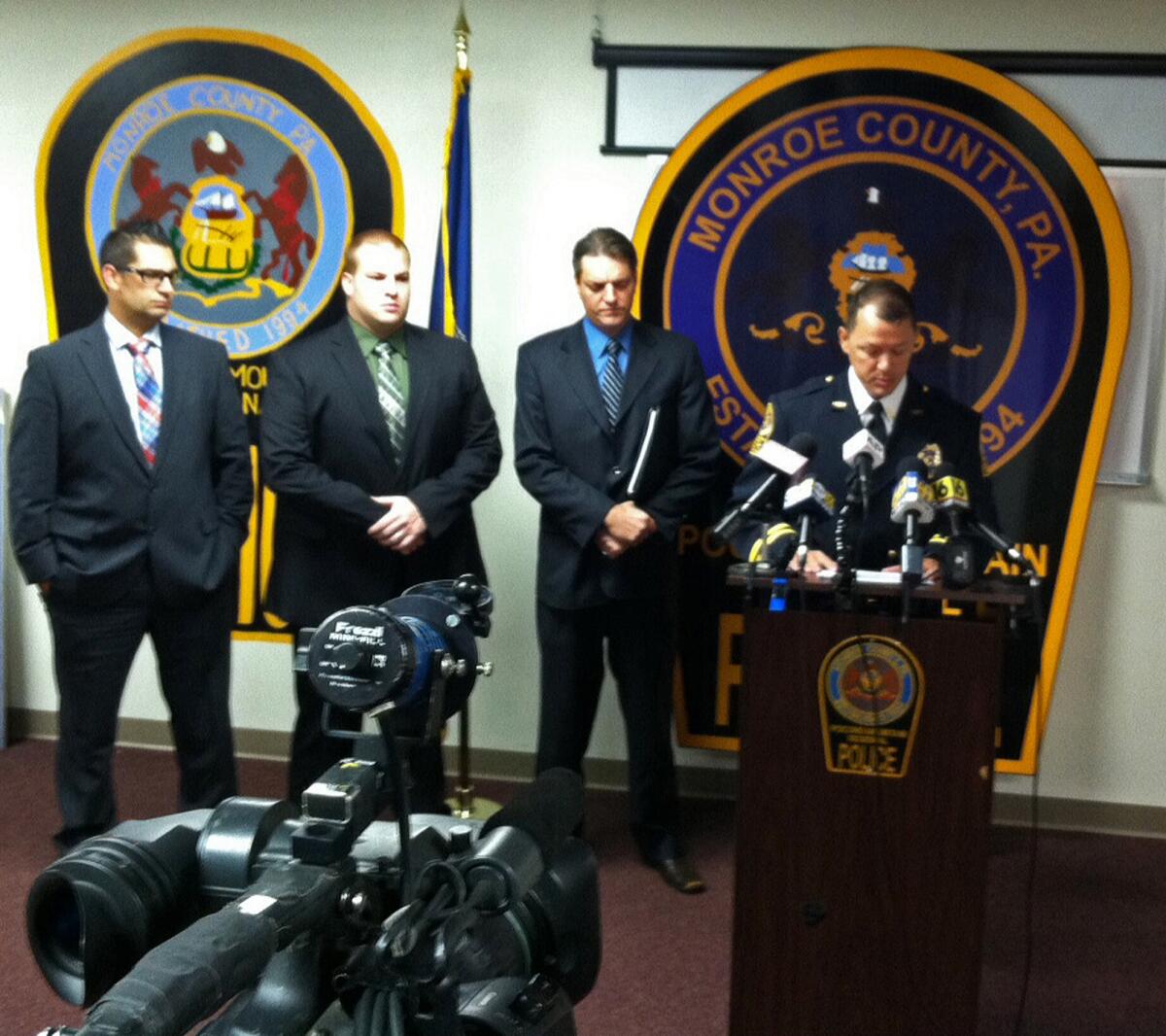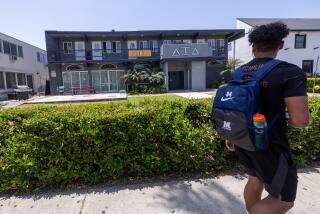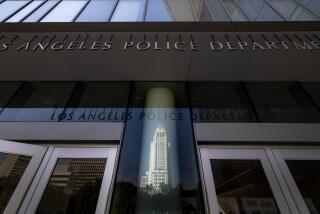37 face charges in fraternity death blamed on ‘brutal’ hazing ritual

From left, Pocono Mountain Regional Police Department Cpl. Lucas Bray, Det. Robert Miller, Monroe County Assistant Dist. Atty. Michael Rakaczewski and Police Chief Christopher Wagner speak during a Tuesday news conference in Pocono Summit, Pa., about plans to arrest 37 people in the December 2013 death of 19-year-old Chun “Michael” Deng.
- Share via
Reporting from New York — By the time Chun Michael Deng -- Michael to his family and friends -- made it to a hospital on that cold December morning, he was struggling to breathe after being beaten and knocked unconscious while staggering blindfolded under the weight of a heavy backpack.
The 19-year-old college student, an aspiring Pi Delta Psi frat brother, died shortly afterward. Nearly two years later, a grand jury has indicted 36 people and the fraternity on charges including murder in the latest example of what prosecutors say is a case of fatal hazing.
Police in Pocono Summit, Pa., a bucolic region about 100 miles west of New York City, announced the indictments Monday, and on Tuesday they said some arrests had been made.
The fraternity was expelled from New York City’s Baruch College, where Deng and his companions were students.
NEWSLETTER: Get the day’s top headlines from Times Editor Davan Maharaj >>
Pi Delta Psi is described on its website as an Asian American cultural fraternity founded in New York in 1994. It lists 25 campus chapters or associate chapters, most of them in the eastern United States but one in California at UC Riverside.
The fraternity’s president did not respond immediately to a request for comment Tuesday.
Baruch imposed a lifetime ban on the fraternity after Deng’s death. It was not immediately clear if any of the people named in the indictment, most of them in their early 20s, remained at Baruch.
College President Mitchel B. Wallerstein said Baruch conducted its own internal judicial review of students involved in the Deng incident and “brought disciplinary proceedings against all of them, except for those who voluntarily withdrew from Baruch College.”
“We owe it to Michael and his family to hold accountable those who were responsible for the senseless death of this promising young man,” Wallerstein said, adding that in addition to banning Pi Delta Psi, the college had imposed a moratorium in fall of 2014 on pledging activities for all fraternities and sororities on campus.
The indictments come on top of a civil suit filed by Deng’s family in Queens, N.Y., where Deng’s parents settled after coming to the United States from China. Deng was their only child.
According to the civil suit, which was filed in April, frat members participated in “this particular, dangerous hazing ritual” even though they knew it had been banned years earlier by the fraternity. Year after year, the lawsuit alleges, the Baruch chapter rented the same site in the Pocono mountains and took aspiring fraternity brothers there for a weekend of abuse.
The civil suit echoes the criminal complaint in alleging that Deng and the other frat pledges were blindfolded, strapped into backpacks packed full of sand, and ordered to run across a field on the weekend of Dec. 7 and 8. As they did, the pledges were shoved and hit by frat members challenging them to make it to the end of the field, prosecutors in Pennsylvania said in a press release.
Prosecutors said police described the ritual as “brutal,” and the forensic pathologist who examined Deng said he suffered multiple blows to his body and sustained a “significant head injury” that knocked him out.
“It would take hundreds of pounds of impulsive loads and/or hundreds of G forces in order to cause the damage to the interior of the brain” that Deng suffered, according to the report.
Deng’s companions allegedly waited at least an hour before taking him to a hospital, where he was pronounced dead on Dec. 9, 2013.
Six individuals, including Pi Delta Psi Fraternity Inc., face charges of murder in the third degree, as well as aggravated assault, simple assault, hindering apprehension, hazing and criminal conspiracy. The homicide charges carry a penalty of up to 20 years.
The others named in the indictment face charges ranging from aggravated assault to conspiracy.
In a statement, Deng’s parents said they applauded the actions by the police, grand jury and Pennsylvania prosecutors to bring criminal charges.
“Too many families have been devastated as a result of fraternity hazing, with at least one student dying every year from hazing since 1970,” said the family in a statement provided by its attorney, Douglas E. Fierberg. “Fraternities and their members must be held accountable, and this step by authorities is an important one. Michael was a wonderful, beloved young man, and, in his honor, the family will also continue pursuing its wrongful death case against the fraternity to cause it and other fraternities to change so that other parents will be spared the loss of a precious child.”
The incident was one of at least a dozen in the last five years involving hazing at U.S. colleges leading to student deaths. In perhaps the most infamous case, in 2011, Robert Champion died after undergoing a hazing ritual of the Florida A&M marching band. The university president resigned and the band leader was convicted of manslaughter in that case.
Follow @TinaSusman for national news
ALSO:
12 dead, 1 missing after ‘wall of water’ slams enclave on Utah-Arizona border
Suspect in Mississippi killings dies from self-inflicted gunshot wound, police say
No end in sight for Seattle school strike; officials warn of later graduation
More to Read
Sign up for Essential California
The most important California stories and recommendations in your inbox every morning.
You may occasionally receive promotional content from the Los Angeles Times.











